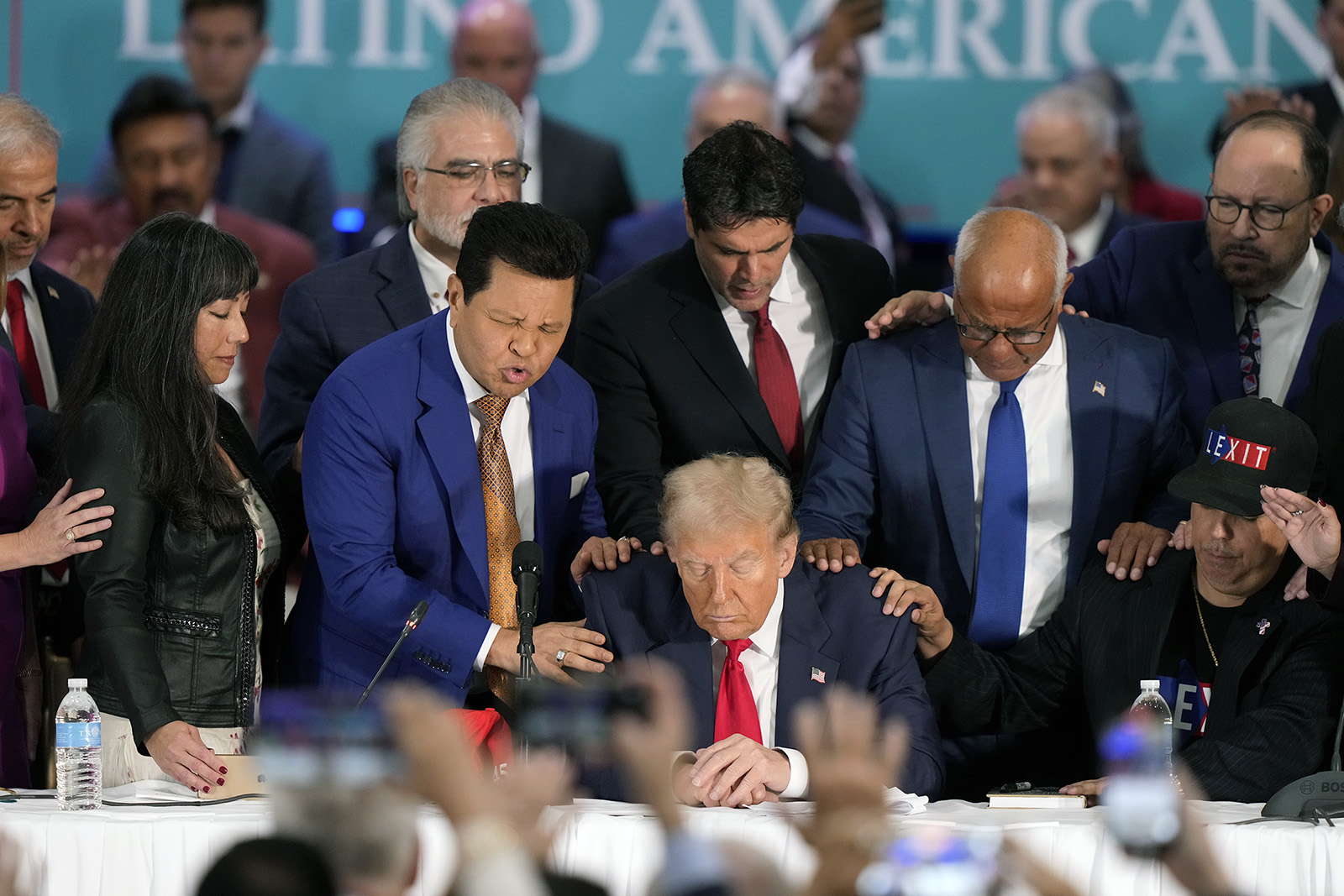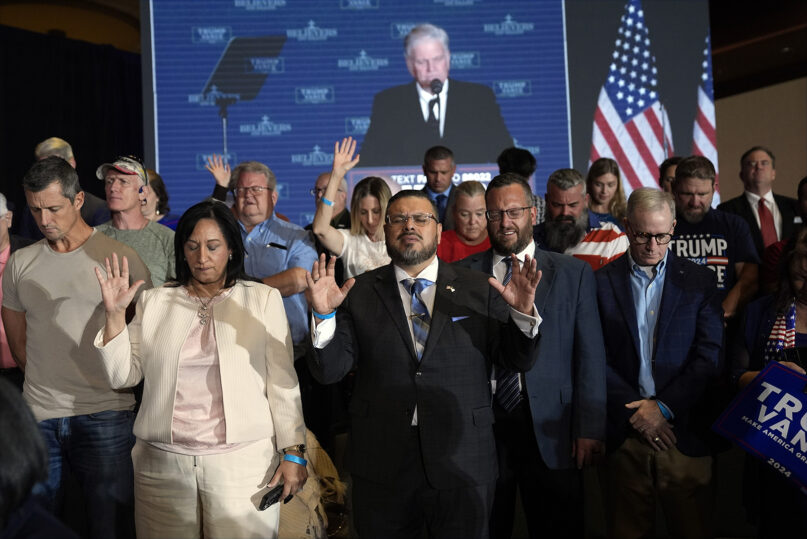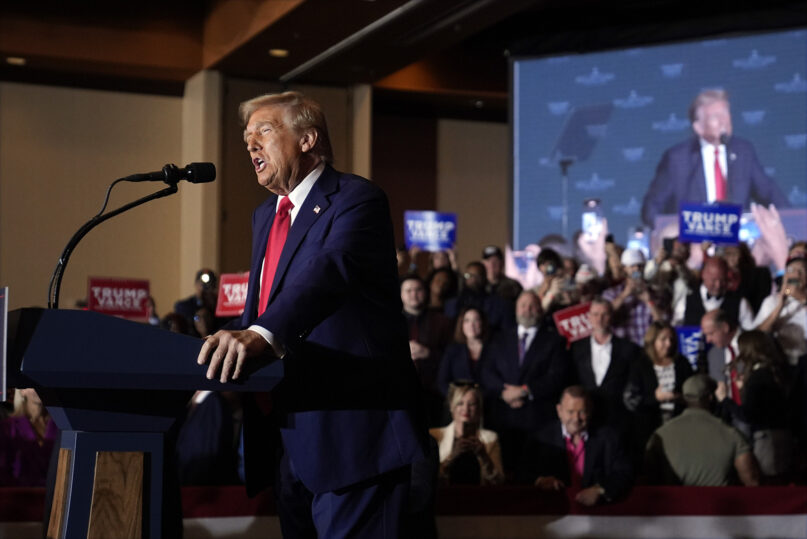
(RNS) — As the 2024 presidential contest enters its final days, former President Donald Trump is turning to the group most responsible for getting him this far: evangelical Christians.
“I’m here tonight to deliver a simple message to Christians across America: It’s time to stand up and save your country,” Trump told a group of pastors in Concord, North Carolina, on Monday evening (Oct. 21). He then implored his religious supporters to flood the polls on Election Day, saying, “On Nov. 5, Christian voters need to turn out in the largest numbers ever.”
It was part of the former president’s closing pitch to his most loyal religious supporters, coming amid a string of faith-themed events across multiple states scheduled for the waning days of his campaign. Trump has made similar arguments in the past, but his God-talk has taken on new forms this year, particularly in the wake of the assassination attempt on his life in July. While the former president’s backpedaling on abortion has frustrated some of his religious supporters, prompting questions of turnout, evangelicals who advise Trump are adamant he will not only retain his long-standing support among their group, but also surprise Democrats by making gains among Hispanic evangelicals as well.
The string of faith-leaning events is something of a pivot for Trump this election. While he has engaged with religion this campaign season — he has sat in for calls with evangelical leaders, for example, and made headlines for promoting a “God Bless the USA Bible” with the tagline “we must make America pray again” — election-watchers have tracked fewer splashy appeals to evangelicals than in past years.
But on Monday, Trump and his allies outlined an argument to evangelicals that mixed policy with God-and-country rhetoric. Before he took the stage in North Carolina on Monday, the former president’s son Eric Trump warmed up the crowd with a fiery speech that implied his father was chosen by God.
“It is so clear to me, more so than ever before, that (Trump) was put here for this mission: to save this country,” the younger Trump said, referring to how his father survived a shooting. “We need God in our life. We need God in society. We need children to respect God. We need God in our schools. And if Kamala Harris won’t say it, I will: We love God and we will always be a nation of faith.”

People pray with Franklin Graham before Republican presidential nominee former President Donald Trump takes the stage at a faith event at the Concord Convention Center, Monday, Oct. 21, 2024, in Concord, N.C. (AP Photo/Evan Vucci)
He was followed by the Rev. Franklin Graham, son of famed evangelist Billy Graham and a longtime supporter of Trump, who led a prayer that implored the Almighty to secure Trump’s victory, saying, “We pray for our nation, and Father if it be thy will that President Trump will win this election.”
Former Secretary of Housing and Urban Development Ben Carson, who serves as the Trump campaign’s “National Faith Chairman,” and former Trump administration official Peter Navarro, who was imprisoned earlier this year on a contempt-of-Congress conviction, also spoke. But it was Trump’s roughly hourlong address featuring a slate of faith-themed proposals that appeared to energize the crowd of pastors.
After insisting his opponent, Vice President Kamala Harris, would “come after Christians all over the country,” Trump promised to create a federal task force to fight “anti-Christian bias,” allow homeschool parents to spend $10,000 a year tax-free on costs associated with their children’s education, ban schools from “promoting critical race theory or transgender gender ideology” and “reaffirm that God created two genders: male and female.”
The proposals were light on details, and the Trump campaign did not respond to requests for clarification, instead sending along a statement by Carson insisting Trump “did more for the faith community than any president in history.” But Trump’s proposals drew praise from attendees such as the Rev. Tony Suarez, vice president of the National Hispanic Christian Leadership Conference, who has served as one of Trump’s evangelical advisers since 2016. Suarez said “every issue” Trump mentioned resonated with pastors in attendance, who he said flew in from different parts of the country to attend.
“We’re seeing enthusiasm not just from leaders, but from the congregants of those leaders,” he said.
Suarez added: “It already feels like a victory rally.”

Republican presidential nominee former President Donald Trump speaks at a faith event at the Concord Convention Center, Monday, Oct. 21, 2024, in Concord, N.C. (AP Photo/Evan Vucci)
The pastor, who works out of eastern Tennessee, acknowledged some evangelicals have been concerned about Trump’s efforts to distance himself from hard-line anti-abortion policies, such as six-week abortion bans in Florida and other states, but Trump’s stance is still far to the right of Harris’. Suarez pointed to reports of the vice president allegedly mocking two anti-abortion protesters who shouted “Jesus is Lord” and “Christ is king” at a recent campaign event, telling the two young men they were at the wrong rally and they should go to the “smaller rally down the street.” (It was unclear if Harris was aware of what the protesters were shouting, and while Trump referred to both as “college students” and Fox News repeatedly identified the men as juniors at University of Wisconsin-La Crosse, the school told Religion News Service only one is currently enrolled.)
The incident has been brought up repeatedly by Trump to frame Harris as an enemy of Christians.
“She’s very destructive to religion,” Trump said. “She’s very destructive to Christianity, and very destructive to evangelicals, and to the Catholic Church.”
He then turned to Carson, just offstage, and added: “Ben, she is your worst nightmare.”
The vibe was similarly religious on Tuesday, when Trump hosted a Latino Americans for Trump roundtable in Florida. Although not promoted as a faith-themed event, the gathering featured a panel that included religious leaders and concluded with attendees praying over Trump for several minutes.
“Today, Lord, we lift up the man we believe you’ve put your hand upon to help restore America and bring America back to the place that honors you, to a place where we will not be kicked out for saying Christ the King, or Jesus is Lord,” said Ramiro Peña, who oversees Christ the King Baptist Church in Waco, Texas.
Peña then prayed that Trump would continue to listen to God and “Make America Godly Again.”
Suarez argued the religious pivot wasn’t a coincidence: Trump has made inroads with Hispanic voters for years, but especially Hispanic evangelicals, and Suarez said he expects the former president’s margins to increase this go-round.
“I think it’ll be the highest Hispanic turnout since George W. Bush,” Suarez said, referring to Bush’s high support among Hispanic voters. He argued evangelicalism itself can also be credited with the shift, saying that as Hispanic Christians “cross over” to evangelicalism from Catholicism and other denominations, that is “reflected in their vote.”
“I think we will all be surprised at how large of a percentage the Hispanic vote is for Trump,” he said.
Trump is also primed to get support from activists such as Ralph Reed, head of the Faith and Freedom Coalition, which boasts a robust field effort in swing states across the country. In a Tuesday email to RNS, Reed praised Trump’s address in North Carolina and said the Faith and Freedom Coalition has already knocked on 7,236,000 doors in the battleground states. He said his team plans to follow up with text messages and phone calls, focusing on “casual and low propensity voters who have voted less frequently in the past.”
Around 625,000 of those door knocks were in Georgia, where Trump hosted a “Believers and Ballots” town hall at a church in Zebulon on Wednesday. During the event, which lasted roughly 30 minutes, Trump insisted Christians were being “persecuted” by Democrats and implored them to vote.
A campaign spokesperson also noted that the “Believers and Ballots” program, which was launched over the summer, aims to up conservative Christian turnout among churches by increasing vote-by-mail and absentee ballots registrations as well as in-person voting. The initiative also recruits “Church Captains” to help organize prayer calls and mobilize their congregation.
“Trump understands this community, knows its leaders,” Reed said, citing Trump’s already high support among white evangelicals in polls, which Reed said he expects “may go higher by Election Day.”
Indeed, a survey conducted by Pew Research in late August and early September found 82% of white evangelicals who are registered to vote said they supported or were leaning toward Trump. But a Washington Post/Schar School poll of swing state voters conducted this month found a slightly lower figure — 78% of white evangelicals said they planned to back Trump, would probably vote for him or have already cast their vote for him.
Any winnowing of support among evangelicals, even small numbers, would be a blow for Trump. That may explain why, during his event on Monday, he accused evangelicals — who are widely known for high voter turnout as a group — of “not voting proportionately like you should.”
“At Trump rallies we don’t tell Christians to get lost, we tell Christians to get out and vote,” he said. “You don’t have the choice of sitting out this election because if Kamala Harris gets four more years, the radical left is not going to leave Christians alone.”
